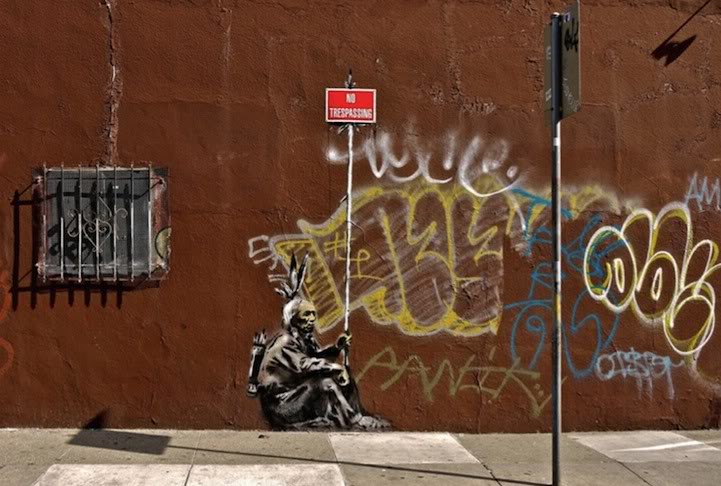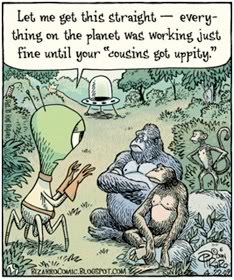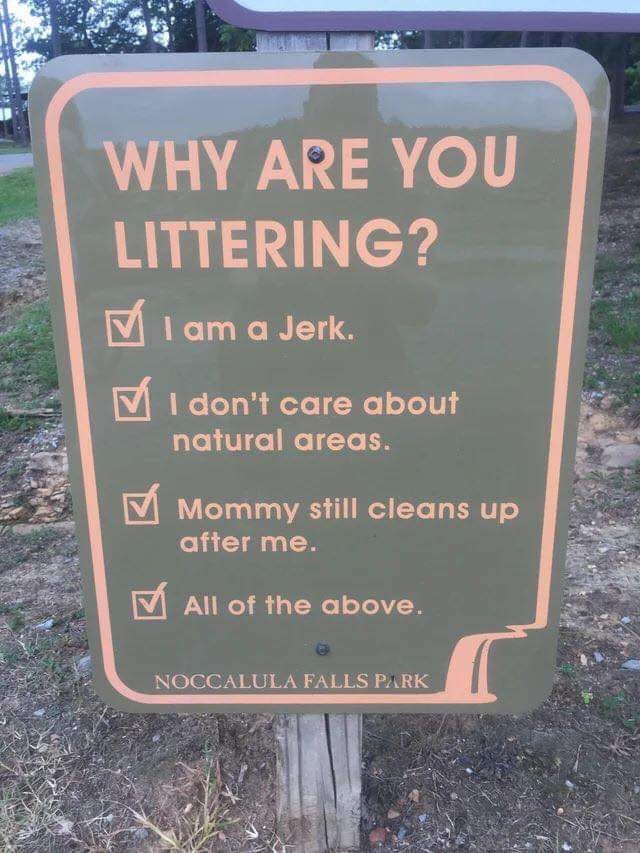It can even lead to the opinion (frequently expressed by those in favour of burying our heads in the sand) that people concerned about humanity’s impacts should do the world a favour and kill themselves. Indeed, as this hypothesis continues to spread, I don’t doubt that it has contributed to actual suicides.
So it seems worth highlighting that it isn’t true.
Now, don’t get me wrong, there might well be a case to classify the particular culture we were born into — this eternal-growth-requiring, industrialised, globalised culture — among the diseases. Unending growth for growth’s sake is truly the ideology of the cancer cell. And very possibly the majority of the humans you are likely to encounter day-to-day hold tight to that culture and its values.
But does that encompass all of humanity? Or indeed, ‘human nature’? Not one bit.
A glance to anthropology reminds us that older human cultures have thrived for tens, even hundreds of thousands of years without causing comparable extinction rates, catastrophically destabilising the climate or teetering on the brink of nuclear annihilation.
People for most of human history have raised children, explored philosophy, created beautiful art and lived good lives without once imagining themselves as intrinsically fated to devastate all around them.
Yet the idea that we are incapable of anything else is becoming so powerful that I can hear the objections already:
Haven’t these older human cultures also caused extinctions?
Well yes, some have. You’ll find no ‘noble savage’ claim here that pre-industrial people or societies were incapable of ecological ineptitude. For example, some argue that humanity’s spread across North America was the key factor in the extinction of the mammoths, giant beavers and others around 11,000 years ago. To quote M. Kat Anderson, author of the impressive Tending the Wild,
“…the peoples migrating into what is now California more than ten thousand years ago undoubtedly experienced a learning curve, apprising the limits to resource use and then adjusting their harvesting and management from the lessons learned.
At times, the result was landscape degradation and species reductions or extinctions, but over the long term, valuable lessons were learned about how to steward nature for future generations.”
In modern parlance, mistakes were made. But lessons were indeed learned. When the indigenous Americans discovered Columbus floating off their shore ten thousand years later, let’s just note that they were not overcome with relief at the prospect of being saved from the ecological devastation they had wrought on the continent. They were doing just fine.
Modern industrial culture, by contrast, increasingly clings to escape from the planet as its last remaining positive (if delusional) vision of the future, having devastated our home with the astonishing, ever-accelerating speed demanded of it by its economics.

Oh, and by the way, for most of human history…
“…the average human being enjoyed economic and political freedoms which only a privileged minority enjoy today. Men decided for themselves how long they would work on a particular day, what they would work at — or if they would work at all.
Women too … generally set up their own daily schedules and paced themselves on an individual basis … earth, water, plants and game were communally owned. Every man and woman held title to an equal share of nature.”
I know which example impresses me more.

Why does it matter anyway? This is the culture that now dominates the world, so to all intents and purposes it is humanity today.
Well, this is exactly the belief that I wrote this article to challenge. As we’ve seen, it’s demonstrably not ‘simply human nature’ to annihilate all around us. No, it’s the nature of this particular human culture. Human potential is so much more, and that’s why conflating the two is so toxic.
Firstly, because claiming that humans are capable of nothing else plants the seed of futility in exactly the people our world so desperately needs — those who see through this society’s hollow self-congratulation and recognise it for the devourer of futures that it truly is.
It encourages such people to channel their disgust into self-loathing, rather than into beautiful resistance, utter rejection of the default path laid out for them, and the creation of radically alternative lives/cultures of fierce inspiration and joy.

Secondly, it takes disrespect for indigenous cultures to new heights to deny that their lifestyles are even part of human nature, especially while so many continue to seek to guide their ‘younger brother’ back towards a better future.
And thirdly, because right now we desperately need a diversity of stories of what humanity can be, for one simple reason: the dominant culture and economy is coming to its end.
To pick one trend among many, that culture has annihilated 60% of the mammals, birds, fish and reptiles that were on the planet in 1970. Put starkly, most of the wild nature that was here fifty years ago is gone. I think we can agree that this (accelerating) trajectory is not sustainable. And it is hopefully not too controversial to note that unsustainable things end.
There are two possibilities from here — we dramatically change direction or we end up where we are headed. Either way, we are on the cusp of radical change.
So don’t buy the story that the status quo is overwhelmingly vast and powerful, far beyond your ability to change it. On the contrary, it is devouring its own foundations, and it is up to us to design the sequels. Those who see this necessity are the pioneers. We were born into a culture of death, but it needn’t hold our allegiance.
Of course, the quiet self-loathing invited by the ‘virus with shoes’ hypothesis is quite convenient for the powers that be — the billionaires, media and politicians who continue to defend and profit from that suicidal status quo, explaining it away as the inevitable product of human nature. But it’s a lie. Nothing obliges us to follow the path — accept the values — laid out for us.

We can do better. So much better. These times call for creativity and imagination in our lifepaths. Humour and magic in our days. Something far more compelling than the mainstream.
For me that has looked like rejecting the twin myths of consumerism and financial independence, quitting my job in 2005 to live cheaply and seek my security in relationships rather than in money. Then using the huge time and energy freed up from earning to educate myself, savour life and do much more than I’m paid to in these urgent times.
For others it might look radically different, but choosing our own aims in life — like, I don’t know, maybe actually having a future worth the name? — is just so much more delicious than striving for the delusional ones laid out for us!

However that looks for you, let’s be so much more than anaemic terms like ‘low impact living’ or ‘sustainability’ suggest is possible. Let’s blow some minds!! As Toby Hemenway pointed out, sustainability is nothing more than the mid-point between destructive activities and regenerative activities. It’s a tediously low bar.
How does it sound if someone asks how your marriage is and you reply “oh, it’s sustainable…”? I mean, I guess it’s an improvement on “honestly, we’re so dysfunctional that we leave a trail of carnage and devastation everywhere we go”, but we can definitely aim higher in our relationships, both with each other and with the world that sustains us.
These times don’t call us to ‘low-impact’ lives.
It’s time to have a huge positive impact. To break the mould. Many people have. Many cultures have. And so can we.





oh, I needed this!
Wonderful. Thanks you.
My pleasure, both. Let’s challenge this depressing narrative wherever we find it!
It’s taken me a few days to get to this but I’m glad I made it. Thank you.
This is exactly the right attitude! Thanks!
I agree. Humanity — our species — is not so much the problem as a certain kind of culture is. What we need is not to extinguish ourselves or our neighbors but to awaken from a kind of “cultural trance,” as often it is called.
Thanks Shaun!
And thanks James for your excellent contributions to the conversation unfolding under the reposting of this piece over at resilience.org
Here, if of interest to others:
https://www.resilience.org/stories/2019-08-08/humanity-not-just-a-virus-with-shoes/
[…] Here’s a good analysis of the problems with ‘green growth’, and a thoughtful riposte to the claim that humanity is just a virus with shoes. […]
Excellent – thought provoking and highly original. Thank you!
[…] Humanity – not just a virus with shoes […]
I’m gonna pass this on with my words and my heart.
[…] Here’s a good analysis of the problems with ‘green growth’, and a thoughtful riposte to the claim that humanity is just a virus with shoes. […]
The behavior that causes mass destruction, extinction, war, oppression and so on should be explained on the bio-psychological level. What is it in western culture that caused the dramatic shift from a rather integrated view of the world and the place of human beings in it to the radical severance from its ‘womb’, the biosphere? What is it in western culture that makes its economic model and promise of happiness through the unlimited accumulation of material goods so appealing to the majority of the people on the planet? The call for hope and resistance and so on is futile if the bio-psychological causes of this behavior and its addictive attraction are not explained. A good starting point is the biochemistry of social status.
Thanks Maureen, well said. The best resource I’ve seen on that is Dr. Nate Hagens’ unusually brilliant and integrated work, presented here as a series of short videos.
Wholeheartedly recommended:
https://www.youtube.com/watch?v=YsgxopIZzto&list=PLdHV4AV3ixB0n2OE8ent9k2RsJfomrGpC
I take exception with the demeaning of “sustainability”. The word does not connote “sustaining things the way they are”, it is entirely about the rates at which human activities take place — rate are sustainable or unsustainable: extract without limitation or extract only what can be taken within the parameters of what can be renewed or safely used without polluting more than can be cleaned up, or destroy Earth’s ecosystems faster than can be restored; or hoard and accumulate wealth at rates that do not allow Earth’s abundance to be fairly shared. Please grow up about this useful word.
Hi Susan, thanks for letting me know that you felt this way. It wasn’t my intention to demean the word “sustainability”, merely to point out that we can aim higher than sustainability.
I would agree with you that sustaining things the way they are would be undesirable, and also agree that that isn’t what “sustainability” implies.
Indeed, your definition of the word is excellent and entirely in keeping with my own understanding. And genuine sustainability would indeed be an astonishing improvement over where we are today. My intended point was simply that we can nonetheless aim higher than that.
Rather than just destroying Earth’s ecosystems slowly enough that they can recover, we could actively help them to heal. Rather than polluting little enough that it can be cleaned up, we could clean the skies, air and waters.
“Sustainability” is as you say a most useful word (indeed I used it myself earlier in the piece), and the move from destructive to sustainable is *hugely* important, necessary work.
I just think that our ambition shouldn’t stop there. To build on that work and go further – to become a force for regeneration – seems to me a far more compelling aim (to my eyes, this is a big part of the excitement and energy behind rewilding, for example).
If we only ever talk about sustainability as our ultimate aim, we risk implying again that humanity is inherently destructive, and that all we can hope to do is slow our destructiveness enough that Mother Nature is able to clean up after us.
I don’t believe that – I suspect you don’t either – and that’s why I suggest aiming higher.
All that said, re-reading the relevant section of my piece above I realised it could have been read that I was suggesting that sustainability is a delusional goal (rather than merely a somewhat anaemic one), so I have tweaked accordingly. If that was what you took issue with, my apologies, and me too!
And thank you for prompting the improvement.
Warmly,
Shaun
I’m looking for more of your writing on these knotty issues having read Transition Timeline, Surviving the Future and bits of Lean Logic. Especially interested if you have attempted any updates to the scenarios you sketched in 2008 in ‘Timeline’?
Bendell recently interviewed Eisenstein on the Deep Adaptation blogsite bout how to transition from the ecocide track to a regenerative one. Have you considered how this scales up and fast enough?
Earth Repair, Everywhere!
from Old 99 Farm, Hamilton ON Canada
“don’t buy the story that the status quo is overwhelmingly vast and powerful, far beyond your ability to change it. On the contrary, it is devouring its own foundations, and it is up to us to design the sequel.”
Without saying it you imply “do buy the option to believe is it within our collective ability to change the status quo”. I have as you have, made dramatic lifestyle changes starting 12 years ago at age 53; self styled ‘doomer-boomer-farmer, downwardly mobile, neo-peasant cognescente’ but this is not the same as culture shifting.
I personally have not yet found a basis to believe this is scalable fast enough to avoid ecological collapse and therefore functional human extinction. Have you?
Hi Ian, and a New Year’s toast to the downwardly mobile!
Interestingly, at my mother’s suggestion, I watched that interview just the other day, and I too was particularly struck by that question. In short – and unfortunately – my straight answer to your final question is no.
Ecological collapse is, to my eyes, already very much ongoing, though it is not yet certain that it will reach its bleak conclusion. As such, while functional human extinction is surely inevitable in the long term (I don’t think our run will be infinite!), I wouldn’t venture to any certainty on whether we will or will not make it through the next century or two.
So what is it that gives me hope that the current omnicidal tendencies of this young human culture might not reach their culmination? As you’ll know from Surviving the Future, it’s not that I believe that green consciousness of our fundamental interconnectedness will spread rapidly enough to overwhelms consumerism (much as we both help to spread that consciousness where we can). Rather it’s the hope that consequences might overwhelm the culture before they overwhelm Nature.
That the branch globalised culture is sitting on and sawing at might fall away before the whole tree dies.
As Derrick Jensen often says, “any option is better than a dead planet”, so in truth I feel as much sympathy with those seeking to sabotage the destructive as with those seeking to enlighten the destroyers.
The section you reference from my above piece was mostly intended to highlight that while the status quo may appear overwhelmingly entrenched and powerful to those living near its heart, in fact the inevitable receding of its influence is already in sight.
So it’s not quite that we can up-end the status quo, more that the status quo is being up-ended as we speak. And as the cracks in its hegemony continue to widen, we have the opportunity to both live and hold out far more wonderful and satisfying lifepaths.
Will this be “scalable fast enough to avoid [total] ecological collapse and therefore functional human extinction”? I honestly don’t know. If I had to guess, I might guess no.
But does believing in and being proud of our lives depend upon knowing that we can control everything, knowing that all the things that we care about were within our power? No.
I quote this Wendell Berry line a lot, but I keep coming back to it:
“Protest that endures, I think, is moved by a hope far more modest
than that of public success, namely, the hope of preserving qualities
in one’s own heart and spirit that would be destroyed by acquiescence.”
Or as I think Charles put it, ‘yes it’s too late, and it’s never too late’.
In short, no I don’t think we can shift the culture fast enough, and it sounds as though you don’t either.
But I continue to wholeheartedly work to raise consciousness where I can, alongside working to prepare us as best I can for the future I see coming. That preserves those qualities in my heart and spirit. It’s never too late for that. That’s what I emerged from this planet to express – what brings me joy and that deep, exquisite feeling of spiritual alignment – and it sounds as though you feel the same way.
And what does preparing the world for the difficult future look like? Defending and restoring wild nature (rewilding, direct action, agroecology, yes, earth repair..!), and defending and restoring the informal economy (Transition, gift culture, community-building, hospitality, love…). As I wrote in this piece last year, these are the systems that will have to support whatever life follows the unfolding collapse.
Ultimately, we can never control consequences, much as they are worth striving for. We can only live lives of careful integrity and wild joy and do our utmost. For me, that’s enough. More than enough. Beyond that, only humility.
In solidarity,
Shaun
ps For more of my writing on this theme – really the essence of my ‘dark optimism’ – check out some of my “Favourite Posts” listed in the right-hand column here.
I just got back here and find your reply of three weeks ago. Was a roundabout click-thru looking for the latest research and critique/endorsement of TEQs. I came to the newsletter that way. Seems desperate to me that world bodies are skeptical “ahead of it’s time’ in 2008, but what about now! I was so hoping to read of one nation or region that was forging ahead with fixed quantity rationing rather than fixed price.I plannedlast fall and will it be offered in 2020? Looking forward to the online version by MT, will be writing him for it.
I tried to get a transition town initiated here in Dundas ON, back in 2009. Lasted a year before we ran out of steam. Maybe the time is approaching again. In the meantime, Extinction Rebellion has my loyalty.
For a young man you’ve earned some precious wisdom already and sound grounded in your life purpose. I salute you. May our paths one day cross.
ig
I didn’t proofread: lost some text in the post midway. Was asking about the Sterling College online LeanLogic course being offered again.
Thanks Ian, I look forward to that day!
For all info on TEQs, including our peer-reviewed paper, see:
https://www.teqs.net/teqs/
But alas I cannot report any enlightened nation yet forging ahead with (as you so aptly put it) fixed quantity rationing rather than fixed price.
Regarding the online ‘Surviving the Future’ course we have developed with Sterling College, it should be launching in a month or so, alongside the full public launch of both our film The Sequel: What Will Follow Our Troubled Civilisation? and the online version of Lean Logic.
To be among the first to hear once the triple-launch date is confirmed, sign up to my aforementioned occasional newsletter here (where you can also take a peek at the previous updates before signing up)
Will be signing up, trying to get study group here in Hamilton ON excited about Lean Logic.
Just came back from Guelph Organic Conference: climate crisis showing up in lots of workshops.
Check out Lean Farm, by Ben Hartman, 2015, Chelsea Green. Small acreage garden farming manual using Ohno/Toyota concepts. Very consistent with Fleming. Hartman is university grad in philosophy, has been farming for 10 years when he wrote the book with his wife Rachel. He quotes Womack a lot, but not Fleming, seems he hadn’t heard of Lean Logic in 2013-14 but he’s with the program: ‘why is the goal always to get bigger, why not make the same livelihood on less?’
Yes, I believe my friends at Chelsea Green (who also published Lean Logic and Surviving the Future) sent him copies, but I don’t know whether he’s found time to read them!
Actually, Hartman and I both spoke at the Oxford Real Farming Conference the other week, but unfortunately mine was something of a flying visit and our paths didn’t cross.
trying to reach you by email don’t have address. pls send.
check Holmgren: Bushfire Resilient Land and Climate Care paper on his website.
I grok you bro. We have come to very similar conclusions though you challenged me to imagine beyond the mundane of “sustainable” though that would be a joy compared with “suicidal”. 🙂
Beautifully written as always Sean. Love your work!
I’m reminded of one of my favorite talks: http://bit.ly/1EabIZL
Ooh, thanks for taking me back to that Nathan. I was there, and that Uncivilisation festival marked the start of my friendships with both Vinay and Mark Boyle, as I remember.
And I’m especially glad to be reminded of this line:
“Let me crystallize what collapse means: collapse means living in the same conditions as the people who grow your coffee. That’s what you mean by social collapse.”
[…] time to widen those cracks by living inside them, by awakening others’ hearts into bravery, by claiming the power we each hold to reshape the future for ourselves and those around us. […]
[…] Humanity – not just a virus with shoes […]